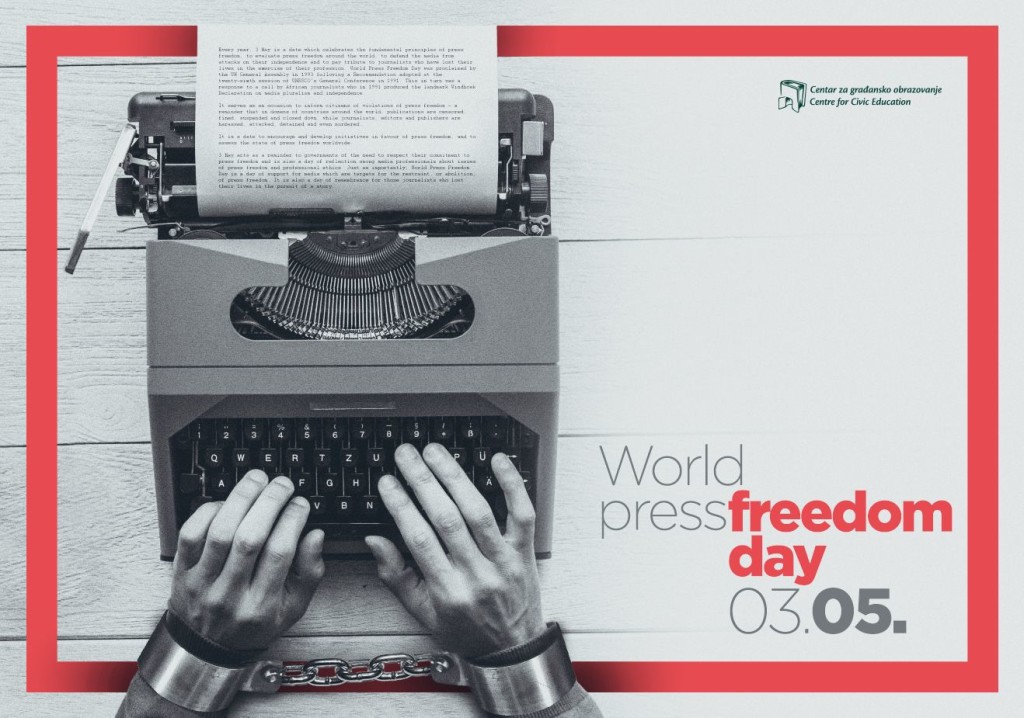Centre for Civic Education (CCE) congratulates 3 May – World Press Freedom Day – to all media and media workers in Montenegro. Unfortunately, there are no reasons for celebration this year as well. Still, this is an opportunity to point to complex position of media in Montenegro and to underline the importance of involvement of all actors in order to systematically start the recovery of the media scene.
This year’s press freedom day, Montenegro welcomes with the worst assessments in all relevant international reports ever. The European Commission notes that no progress was made in the reporting period, with the lasting polarization of media and challenges in understanding the role of free media. Also, the EC points that “…Political interference in the national public broadcaster (RTCG) and the Agency for Electronic Media (AEM) are a matter of serious concern”, referring to the dismissal of representatives of the civil sector who were unsuitable to the authorities. Moreover, in the analysis of the experts of the Council of Europe, supported by the EU, it is assessed that Montenegro progress one step forward, two steps backwards and that providing ad hoc solutions in the legislative framework does not contribute to the overall media development. This analysis has, at the same time, confirmed the enduring findings of the CCE, and it states: “There is a multiple and cumulative evidence that these funding mechanisms are used to support “progovernment media”. This is a highly destabilizing factor, threatening not only the market players, but also undermining the principal role of the media as well as the citizens’ trust in them”. Furthermore, the last US State Department report brings almost identical remarks, while according to the annual assessment of the Reporters without borders, Montenegro takes 103rd place out of 180 analysed states, namely it is almost the worst in the region.
The CCE has been indicating for years that the media operate under direct and indirect political pressures which are deepening media polarization, increasing obvious self-censorship, as well as soft-censorship due to the eroded media market. In such conditions, the further sustainability of Montenegrin media is questionable, and it is especially challenging situation in those media that are addressing current socio-political affairs in critical manner. Such context puts restrictions on media in the implementation of their basic role – controllers of political decision makers, i.e. in objective, timely and professional informing of citizens, with respect of professional standards. Despite the seriousness of ratings and warnings that are not only provided by critically oriented non-governmental organizations in Montenegro, but are already an integral part of the most relevant international reports, the Government of Montenegro continues with inappropriate patterns of behavior towards media and does not show intention to systematically approach to the resolution of this problem.
The past year was also marked by the ever more brutal pressure of the Government and the ruling party, with the support of coalition partners, to the public broadcaster RTCG, followed the illegal dismissal of inadequate members of the Council and the appointment of those who are at the discretion of the authorities with deprivation of rights of public to know who supported some of these new members of the RTCG Council. Also, no progress has been made in investigating attacks on journalists, but the attacks, unfortunately, continue to occur, and some of the earlier cases have become obsolete because of the unwillingness of institutions to devote themselves to their adequate resolution. Non-transparent and discretionary funding of media from public funds is continuing, thus destroying the media market. The tabloidization of not only the media, but also the public sphere as a whole, is stimulated, and the media close to the authorities are openly becoming the means of the authorities for confroting critics. In short, there is a “red line” with the commitment of the authorities to continue the collapse of the media environment at the expense of the public interest and democratization of society, and for the sake of particular political interests.
Montenegrin society faces a huge challenge in the promotion of genuinely free media that practice responsible, fact-based reporting, while rejecting official manipulations. It is in the public interest to have the media that can remain independent and persistent despite obvious political and economic influence and pressure, and thus contribute to building of responsible institutions. The broadest social dialogue with a strategic approach to building an incentive environment for freedom of expression and media, improvement of legal framework, consistent implementation of laws and regulations that prevent media interference and reporting, but also work on strengthening professional standards and adherence to the Code of Ethics are key to recovering the media scene in Montenegro and the strengthening of the media community and the credibility of the media.
Ana Nenezić, Programme Coordinator

